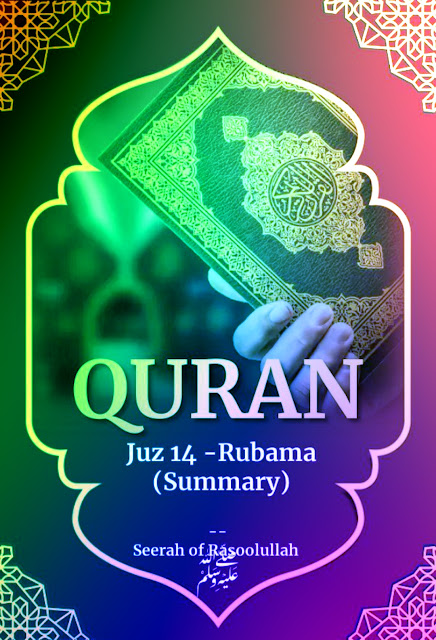Quran Juz / Part / Para - 14 Rubama Summary in English language
Juz 14 - Rubama Summary in English
• Surah Hijr: This Juz starts with Surah Hijr (the chapter’s first verse is in Juz 13 though), which talks about the people living in the Valley of Hijr (Hegra) i.e. the Tribe of Thamud.
• This brief chapter is uniquely themed at the foundational principles of Islam: Tawheed (Oneness of Allah), Risalah (messengership), and the Hereafter.
• Allah tells Prophet Muhammed ﷺ that though the disbelievers do not wish to accept Islam, a time will come when they wish they should have accepted it.
• As per a hadith, this will happen when they’ll see some Muslims too in Hell, undergoing a punishment. The disbelievers who knew them in life one earth will then taunt them and say that they were Muslims and how come they are in Hell.
• However, at the completion of the Muslims’ punishment tenure, Allah will place them in the Heaven. Seeing it, the disbelievers will wish that they should have accepted Islam in their lifetimes.
• Verse 22 on talks about the Might and Majesty of Allah, and His control over the nature.
• Allah says that the sky has been secured against Shaytan. If the Shayateen try to come toward it to listen to the heavenly affairs, Shahab Mubeen chases them to scares them away.
• Allah says that the lands have been anchored by mountains, so that it remains firm.
• Then there is a mention of the Water Cycle.
• Allah says that life and death is in His Control. And that He knows very well of those who have lived and died, and also those who are living and are about to take birth.
• Allah talks about how easy it is for Him to assemble every soul on the Day of Judgement.
• Verses 26 on discuss the creation of humans and genies. Allah made humans from dry clay, genies from smokeless fire.
• He the Exalted asked the angels to prostrate human after He would blow His spirit into it. Every angel did so, except Iblees. It is noteworthy that one of the reasons why human being is at an elevated place is because of the spirit (Rooh) given to him/her by Allah.
• Iblees then vowed to take away humanity from the right path, which leads to Allah’s pleasure.
• Allah told Iblees that he will not be able to mislead His sincere slaves, and promised Hell to those who will follow Iblees.
• Allah took the responsibility to safeguard the Holy Quran.
• Then Allah mentions about the people of Sayyiduna Lut (alaihissalam), and the Tribe of Thamood & their place Hijr (Hegra in English).
• Then Allah says that He Himself is enough to those who make fun and mockery of Prophet Muhammed ﷺ.
• Surah Nahl: Nahl means honeybee. Allah talks about the mind-boggling ability of the bee to make honeycomb and produce honey.
• Honeybee is just another insect, but with the abilities given to it by Allah, it performs such amazing tasks which human brain finds fascinating.
• The honeybees make a hive, distribute responsibilities among themselves, and collect nectar from far-lying trees and plants.
• Every hive has about 20 to 30 thousand hexagonal cells. It has separate cells to store honey, to beget their younger bees, and to collect waste from them.
• One queen bee rules over thousands of them.
• Few of the bees take care of their younger ones, few work as security force for the queen, few are into engineering and designing of the honeycomb, others remain on guard duty which check the hygiene of the bee returning from different places.
• Overall, there are many things in the honeybee for a human being to wonder about.
• Allah mentions other of his blessings, and as such this chapter is also called as Sura Na’am (blessings).
• Allah speaks of the travel through seaways. Allah says that it also provides people fresh seafood, and pearls to make ornaments.
• Allah talks about his blessings to humanity because one of the characteristic features of humans is to recognize it and be thankful.
• Allah then talks about the polytheists who relate girls to Allah. Allah says that they themselves used to get dejected upon hearing of the birth of a girl in their families. Allah is Glorious and is free and from having relatives.
• In the verse 90, Allah commands the establishment justice and caretaking of the poor, and orders abstinence from indecency.
• In the next verse Allah orders fulfilment of promises and prohibited going against them.
• Allah promised the grant of a pure life (free of sins) for those who do good, and of the best reward.
• In the verse 103, Allah responded to the allegations and blasphemy against Prophet Muhammed ﷺ.
• Verse 106 of this chapter gives the permissibility of uttering Kalima Kufr (those words/phrases if said with certainty, a person becomes a disbeliever) when a Muslims is surrounded by the non-Muslims, and forced to utter it with no other option left than getting killed. Though it is superior for a Muslim to get killed even in such instance.
• Then there is a brief list of the permissible and impermissible consumables.
• Allah then commanded to adopt Sayyiduna Ibraheem’s (alaihissalam) approach toward life and Islamic propagation.
Reference: Aaina Mazameen Qur’an (originally Urdu) by Maulana Afroz Quadri, South Africa.
Its English translation is being produced under the guidance of Prof. Dr. Syed Aleem Ashraf Jaisi (Allah protect him), HoD Arabic, MANU University; President, The Qur’an Foundation, Hyd., Ind.
The Urdu Copy (source) is available on Play Store: https://play.google.com/store/apps/details?id=com.gulamrabbanifida.wafasoft.islamicsixkalmaapp
Do visit all below Juz (1-30):
Please share this message to gain equal thawab.
Join Seerah of Rasoolullah (ﷺ): https://chat.whatsapp.com/CQrpoYjTWdS77zQpPf6KEf






0 Comments